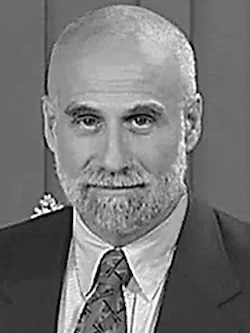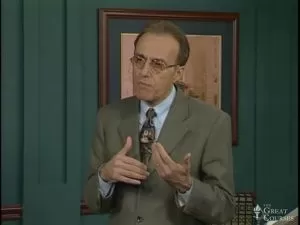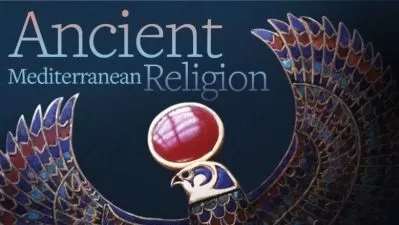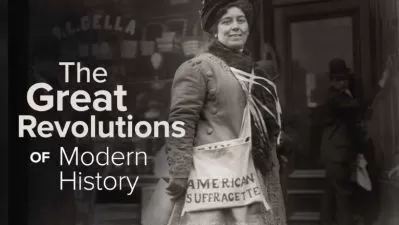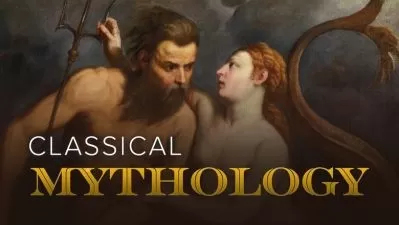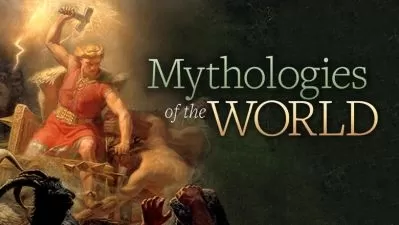Plato's Republic
David Roochnik
12:13:05
Description
It is the first work in the history of Western political philosophy and, arguably, the most influential—so influential that the entire European philosophical tradition has been described as being nothing more than a "series of footnotes" to its author. Yet Plato's Republic, more than 2,000 years after its appearance, and in spite of the many provocative directions those footnotes have taken, still remains astonishingly relevant in its own right.
It poses one question after another that might well have been drawn from the headlines and debates of our nation's recent history:
- What sort of person should rule the state? Is it ever permissible for a ruler to lie to the citizens? Should women be given the same political opportunities as men? What is the role of education in politics?
- Should citizens be allowed full freedom when it comes to sexual relationships and private property?
- Are all citizens equal before the law?
- Is censorship of music and literature ever justifiable?
- Should everyone have equal access to health care?
And these questions, no matter how vital they may be on their own, are only intellectual stepping stones along the pathway of Plato's greater inquiry—the question of defining justice itself and the reasons why a man or woman would choose a life aligned with that virtue.
In Plato's Republic, Professor David Roochnik leads you through the brilliant dialogue Plato crafted both to define and examine the issues with which political philosophy still grapples.
Chapter by chapter—what the Republic presents as "books"—Professor Roochnik introduces you to Plato's literary recasting of his own great teacher, Socrates, and the dialogue through which Socrates and the Republic's other characters create the hypothetical ideal city. It is by dissecting life in this presumably just city—the "Republic" of Plato's title—that the nature of justice itself can be examined.
Explore Justice through the Socratic MethodSocrates presents question after question, refuting each in a manner that leads to still another question, as Socrates's—and Plato's—ideas about the nature of justice and the society necessary for justice's emergence gradually unfold.
Many of those ideas will startle contemporary readers, who may recognize in them the foreshadowing of some of humankind's darkest moments.
Plato, for instance, has Socrates present what has come to be known, notoriously, as the "noble lie," the assertion that human beings are not born of their parents but of the city itself. Moreover, those men and women are born into three predetermined social classes—with souls containing gold, silver, or bronze—that must never mingle.
Preserving that purity of class—very similar to a caste system—also means the careful supervision of reproduction. If a bronze-souled child, for example, is born to a gold-souled woman, it is taken away to be raised by citizens of like soul.
If this sounds suspiciously like what we have come to know as the eugenics once offered as a route to racial purity, making you uncomfortable and suggesting why some have called the Republic the "great-great-grandfather of all totalitarian experiments," then Professor Roochnik would be far from disappointed.
Indeed, that discomfort with one of the great names in philosophy—literary character or not—is something he believes is a very good thing.
"Socrates's proposals will cause readers to object. They will find, however, that even if they disagree with what Socrates recommends, developing arguments against his proposals is a most valuable exercise," he says.
"They will be forced to think through basic assumptions concerning politics. For example, almost all of us believe political freedom is a good thing, and that all citizens should be counted as equal before the law. But why? Plato will encourage us to defend our most cherished beliefs."
Repeatedly, Plato puts those beliefs to the test.
Can You Defend Your Beliefs Against Plato?
Do you believe in freedom of the press and in an artist's right to set forth the ideals he or she believes in?
Socrates's ideal city is one in which cultural activity, because of its central role in forming the character of its citizens and developing the city's guardians and leaders, must be strictly censored and controlled. He notes that it is "imperative for the rulers of the city to supervise the makers of tales."
Do you believe there should be universal access to medical care, and that the infirm, or those with less to contribute to society, deserve to be treated?
In Socrates's ideal city—which he is constructing, remember, to examine the definition of and reason for justice—doctors exist to further the well-being of the city. If those who are less useful to the city, or no longer useful at all, must therefore go without care, even to the point of death, so be it.
More details
User Reviews
Rating
David Roochnik
Instructor's Courses
The Great Courses
View courses The Great Courses- language english
- Training sessions 25
- duration 12:13:05
- Release Date 2023/05/10





